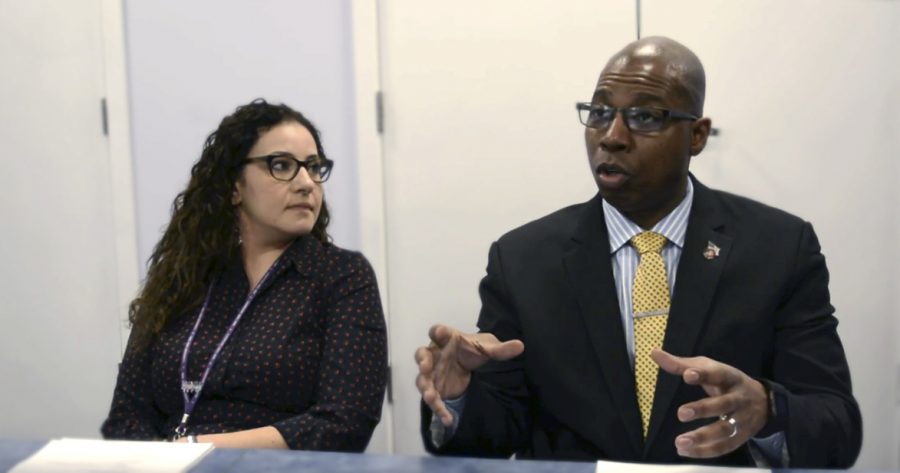NYU Public Safety Attempts to Secure Accreditation
The Director of Professional Standards and Accreditation Manager, Heba Nassef Gore, and the Associate Vice President of Public Safety, Fountain Walker. The pair are working to implement a program designed to offer professional development resources to security organisations.
February 27, 2017
NYU’s Public Safety team is working to secure its place as the second campus security department in the country to achieve accreditation from the Commission on Accreditation for Law Enforcement Agencies. This program, according to its website, will promote the efficient use of resources and service delivery through a proven modern management model.
CALEA — a non-profit organization formed in 1979 — has a number of different accreditation programs, but NYU is currently pursuing the Campus Security Accreditation Program. The program, which was created in 2010, is designed to deliver a professional development resource for security organizations, as well as providing services such as organization and management, training and career development and situational training for critical incidents.
NYU Public Safety said its goal has been to achieve accreditation since Vice President of Global Campus Safety Marlon Lynch began working at the university last September. Director of Professional Standards and Accreditation Manager Heba Nassef Gore is leading the charge to implement the CALEA accreditation, and she said this program will heavily benefit the university.
“[Accreditation] helps formalize our processes and practices,” Gore said. “It helps us manage control over our initiatives, it helps us with training and development of our staff internally, and it helps us improve on our service delivery for our NYU community.”
Gore said that once universities enroll with CALEA, they must undergo a two-year self-assessment during which they must review all internal policies, written directives, protocols and standard operating procedures across the entire Public Safety department.
“It’s an on-going review of our department to make sure that we are meeting industry standards [and] best practices,” Gore said, “And that we are meeting the needs and goals that we have set out for ourselves in providing the security service that we do for the university. We have not yet signed the call contract, but we have a policy review committee that has been formed, and we are developing policies, protocols and [standard operating procedures], and we are getting them to the point where we are ready to sign the contract to begin the two-year clock where we can form our self-assessment.”
She said that in order to achieve accreditation, there are 294 standards in the 34 chapters of the manual that must be met. These standards cover everything from the micro level — the role of every person in the department, patrol administration and training professional development — to larger organizational standards. Gore said that the goal is to have enough written directives to ensure that NYU is performing according to industry standards, if not exceeding them.
Associate Vice President of Public Safety Fountain Walker is working alongside Gore to facilitate the university’s efforts, and he said a part of the reason Public Safety wanted accreditation for security is that other university entities are already accredited, such as nursing institutions, health services and academic profiles. He wanted to standardize accreditation across the university.
“I could come in and say we should look this particular way, or walk this particular way or conduct ourselves this particular way, but if we had a standardized process — it’s that much better,” Walker said. “It also sets the blueprint up for everybody, so moving forward in the future, let’s just say there’s a leadership change, they have an operational manual that can be utilized. And that’s in the best interests of the institution, because sometimes in a transition, things are lost.”
Walker said that students can expect to see changes in the specific roles of individual Public Safety officers, because in certain situations, a number of officers are still not familiar with their responsibilities. Walker said that standardization of training will aid with this problem.
“Let’s think about what if there was a fire in the dorm,” Walker said. “We have individuals that are specifically trained to be fire life safety directors. So that person has a set of training because the building requires it by the [Fire Department of New York] code, but every officer doesn’t have that level of training. Every officer should be able to assume that kind of emergency management role in that building and you as the community should recognize that.”
He believes that accreditation will provide officers with the tools to address a wider variety of issues, so that when students request help they will be directed to the appropriate resources. Walker said that students will notice a difference over time and that at some points during the process there will be opportunities for community input.
“Our goal is to look at NYU’s Department of Public Safety and say that we are the model now for any and all campus security entities,” Walker said.
A version of this article appeared in the Monday, Feb. 27th print edition
Email Jemima McEvoy at [email protected].
UPDATE: The previously headline of this article, “NYU Public Safety Secures Accreditation,” which inaccurately reflects the article. The headline has been updated to “NYU Public Safety Attempts to Secure Accreditation.”
























































































































































